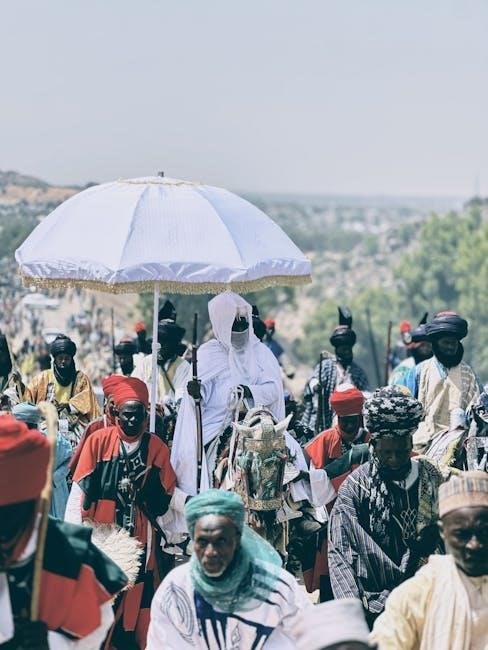The 12 Tribes of Israel originated from Jacob’s 12 sons‚ forming the foundation of the biblical narrative. Each tribe played a unique role in shaping Israel’s identity and spiritual legacy.
1.1 Historical Background
The 12 Tribes of Israel trace their origins to the sons of Jacob‚ who was renamed Israel by God. These tribes formed the core of the ancient Israelites‚ emerging as a distinct nation after their liberation from Egypt. Each tribe was assigned specific territories in the Promised Land‚ shaping their identities and roles. The tribes’ history is marked by periods of unity under leaders like Moses and Joshua‚ followed by division into the Northern and Southern Kingdoms. This historical journey laid the foundation for their spiritual and cultural significance in biblical and modern contexts.
1.2 The Significance of the 12 Tribes in Biblical Narrative
The 12 Tribes of Israel hold profound significance in the biblical narrative‚ symbolizing God’s covenant with Abraham and His chosen people. They represent divine promises of land‚ posterity‚ and blessings. Each tribe embodies a unique aspect of God’s plan‚ contributing to Israel’s identity and spiritual mission. Their stories illustrate themes of faith‚ obedience‚ and redemption‚ shaping the moral and theological framework of both the Old and New Testaments. The tribes’ collective journey reflects God’s sovereign will and His ultimate plan for humanity‚ making them central to biblical theology and heritage.

The Names and Lineage of the 12 Tribes
The 12 Tribes of Israel descended from Jacob’s 12 sons‚ each becoming a distinct tribe. Their lineage forms the foundation of Israel’s historical and cultural identity.
2.1 The Sons of Jacob and Their Roles
Jacob’s 12 sons‚ Reuben‚ Simeon‚ Levi‚ Judah‚ Dan‚ Zebulun‚ Gad‚ Asher‚ Issachar‚ Naphtali‚ Joseph‚ and Benjamin‚ became the patriarchs of the 12 Tribes of Israel. Each son’s character and actions shaped their tribe’s identity and responsibilities. Judah‚ for instance‚ was destined for leadership‚ while Levi was set apart for spiritual duties. The sons’ roles were further defined by their blessings and curses from Jacob‚ influencing their tribes’ futures. Their diverse personalities and experiences laid the groundwork for the tribes’ unique contributions to Israel’s history and covenantal mission.
2.2 The Replacement of Levi and Joseph with Ephraim and Manasseh
The tribes of Levi and Joseph were uniquely reconfigured. Levi‚ though a son of Jacob‚ was not allocated land due to his actions‚ focusing instead on priestly duties. Joseph‚ favored by Jacob‚ had his two sons‚ Ephraim and Manasseh‚ elevated to tribal status. This adjustment ensured the 12 tribes remained intact‚ with Ephraim and Manasseh representing Joseph’s legacy. Their inclusion emphasized divine providence and maintained tribal balance‚ reflecting Jacob’s blessings and the broader covenantal promises to Israel.

Responsibilities of the Tribes
The 12 tribes of Israel had distinct roles‚ with Levi handling priestly duties and Judah leading in governance; Other tribes contributed to societal and spiritual functions‚ ensuring collective prosperity.
3.1 Spiritual and Priestly Duties of the Tribe of Levi
The Tribe of Levi was uniquely appointed by God to serve as the spiritual leaders of Israel. They were responsible for officiating sacrifices‚ maintaining the Tabernacle‚ and upholding the sacred laws. As descendants of Aaron‚ they performed priestly duties‚ while other Levites assisted in temple services and teachings. Their role was essential for preserving Israel’s covenant with God and ensuring spiritual purity. The Levites were also teachers and judges‚ guiding the people in righteousness. Unlike other tribes‚ they received no land inheritance‚ relying instead on tithes and offerings for support‚ emphasizing their divine calling.
3.2 The Leadership Role of the Tribe of Judah

The Tribe of Judah held a prominent leadership role among the 12 Tribes of Israel. As the fourth son of Jacob‚ Judah was destined for kingship‚ as prophesied in Genesis. His descendants‚ including King David‚ established Judah as the royal tribe. The Messiah was foretold to emerge from Judah’s lineage‚ solidifying their divine appointment. Judah’s leadership extended beyond monarchy; they often led in times of crisis and played a central role in Israel’s governance. Their prominence was recognized in biblical narratives‚ highlighting their responsibility to guide and protect the nation’s spiritual and cultural heritage.
3.3 The Role of Other Tribes in Governance and Society
Beyond Judah and Levi‚ other tribes played vital roles in governance and society. Tribes like Dan and Naphtali contributed to judicial and administrative duties‚ ensuring justice and order. Issachar‚ known for wisdom‚ often advised leaders‚ while Zebulun and Asher excelled in trade and commerce‚ supporting the economy. Gad and Reuben‚ though sometimes rebellious‚ provided military strength and protection. Each tribe’s unique skills and responsibilities fostered a balanced society‚ ensuring the collective well-being of Israel and the preservation of their covenant with God.

Prominent Tribes and Their Unique Roles
Prominent tribes like Reuben and Dan played crucial roles‚ with Reuben leading in times of crisis and Dan excelling in justice and judgment‚ shaping Israel’s governance and society.

4.1 The Tribe of Reuben and Its Leadership in Crisis
The Tribe of Reuben‚ as the firstborn of Jacob‚ initially held a prominent position among the 12 tribes. Despite losing the birthright due to Reuben’s misconduct‚ the tribe demonstrated strong leadership during crises. They often acted as mediators and strategists‚ ensuring unity and stability. Their role in guiding Israel through challenging times highlighted their wisdom and loyalty‚ making them indispensable in maintaining the nation’s cohesion and identity. Reuben’s legacy symbolizes resilience and the ability to rise beyond setbacks‚ playing a pivotal role in Israel’s history and governance. Their contributions remain a testament to their enduring significance.
4.2 The Tribe of Dan and Its Judicial Responsibilities
The Tribe of Dan was entrusted with significant judicial responsibilities‚ ensuring justice and maintaining order within Israelite society. Known for their wisdom and impartiality‚ they served as arbitrators in disputes and upheld the law. Dan’s role in preserving societal harmony and ethical standards was vital‚ reflecting their commitment to righteousness. Their judicial duties underscored the importance of fairness and integrity‚ making them a cornerstone of Israel’s legal framework and moral governance. This role not only emphasized their leadership but also their dedication to upholding divine and communal laws. Their legacy endures as a symbol of justice.

The Dispersion and Modern Relevance of the Tribes
The dispersion of the 12 Tribes of Israel led to their spread across the globe‚ with the Ten Lost Tribes becoming a enduring legend. Today‚ their legacy influences modern religious and cultural practices‚ with many seeking to reconnect with their ancestral roots‚ particularly through the symbolic roles of Ephraim and Manasseh in contemporary interpretations of biblical prophecy and identity.

5.1 The Legend of the Ten Lost Tribes

The Ten Lost Tribes refer to the northern tribes of Israel exiled by Assyria in 722 BCE‚ disappearing from biblical records. Their fate became a enduring legend‚ sparking speculation about their possible survival and modern-day identity. The tribes of Reuben‚ Simeon‚ Levi‚ Dan‚ Naphtali‚ Gad‚ Asher‚ Issachar‚ Zebulun‚ and Ephraim were among those lost. The legend has fueled theories of their dispersal across the globe‚ influencing religious and cultural narratives. Despite historical debates‚ the mystery remains a captivating topic‚ symbolizing the enduring legacy of Israel’s ancient divisions and the hope of reunification.
5.2 The Role of Ephraim and Manasseh in Modern Interpretations
Ephraim and Manasseh‚ as the sons of Joseph‚ hold unique significance in modern interpretations. They represent divine blessings and restoration‚ symbolizing the dispersed Israelites’ return. Ephraim‚ often linked to the “House of Israel‚” embodies a broader‚ prophetic identity. Manasseh‚ while less prominent‚ underscores resilience. Together‚ they inspire contemporary movements emphasizing spiritual renewal and unity. Their legacy is interpreted as a call to reclaim ancestral responsibilities‚ fostering a sense of purpose among modern descendants and believers. This duality reflects the enduring symbolic power of the 12 tribes in shaping cultural and religious identity.
The 12 Tribes of Israel remain central to biblical history‚ symbolizing divine purpose and cultural identity. Their legacy endures‚ inspiring modern spiritual and cultural practices globally today.
6.1 The Enduring Legacy of the 12 Tribes
The 12 Tribes of Israel have left an indelible mark on history‚ shaping Jewish identity‚ Christianity‚ and Islam. Their stories‚ responsibilities‚ and traditions continue to inspire spiritual and cultural practices. The tribes’ unique roles‚ from Judah’s leadership to Levi’s priesthood‚ underscore their divine purpose. Despite dispersion and historical challenges‚ their legacy endures‚ symbolizing resilience and faith. Modern interpretations often draw parallels between ancient tribal dynamics and contemporary societal structures. The enduring legacy of the 12 Tribes remains a testament to their profound impact on global religious and cultural heritage‚ bridging past and present.
6.2 Their Impact on Contemporary Religious and Cultural Practices
The 12 Tribes of Israel continue to influence modern religious and cultural practices‚ with their stories and symbolism woven into traditions. Many faith communities draw inspiration from their historical roles‚ such as Judah’s leadership and Levi’s priesthood. The concept of the Ten Lost Tribes sparks curiosity and debate‚ while the legacy of Ephraim and Manasseh is reinterpreted in contemporary contexts. Their cultural impact is seen in art‚ literature‚ and education‚ reflecting enduring themes of unity and diversity. The tribes’ heritage remains a vital part of global religious dialogue and identity‚ shaping conversations about faith and community today.
